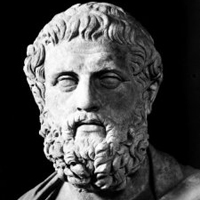Dramatic Technique in Oedipus Rex
Dramatic technique refers to all the devices that a dramatist has used for designing the plot and bringing out the theme and effect of the drama. Sophocles has used the typical elements of the plot of classical tragedy which evolved from the ritualistic performances of ancient Athens:

Sophocles
1. The use of the chorus; 2. The use of a familiar myth whose meaning and significance he has to explore and convey; 3. The use of the separate formal scenes of entry of characters and chorus, which were called the prologue and parodos; 4. The use of scenes of exit of both the chorus and the characters which was called the exodus; 5. The use of thematic messages and tragic songs, revealing the nature of man's destiny and duty towards the gods and the divine law.
But, besides the above elements of the plot, Sophocles has used many other dramatic techniques or elements like irony, poetry, flashback, extreme economy of dialogue and action, the unities of time-place-and-action, and tragic intensity. To these, we might also add the special thematic element of tension between man's will and the divine will, or the conflict between man's determination and the theory of determinism which says, "What has been plotted cannot be blotted".
The use of irony is perhaps one of the most striking parts of Sophocles' dramatic technique. The whole life and efforts of Oedipus is an unconscious rushing into what he is adamantly trying to avoid. That is the bitterest irony, the irony of fate. The irony of Oedipus is also thematic and universal; despite all our relentless efforts to avoid many kinds of inevitable forces and misfortunes of life, we are also tragically bound to be governed and ruined by them. In our lives too, there are things like death and disasters, chances and forces beyond our control, and many things beyond our understanding.
The flashback is another important technical element that is used to design the drama of Oedipus. The plot, in fact, goes backward in terms of knowledge, along with the exploration or investigation into the truths about the plague and then the birth and background of the hero Oedipus; though, of course, the dramatic action goes forward. We see that the flashback not only dominates in terms of the amount of information, but also in terms of the significance of it. The whole thing has happened, and we only go more and more back into the womb of the puzzles about the fate of Oedipus, into the past.
The poetic and highly economic dialogue is another equally unique and important aspect of the dramatic technique in this play. The dialogue is so economical and poetically expressive that it holds our breath as well as, attention from the very beginning of the drama. Of course, the unities of time, place and action are also observed by the dramatist: The actions take less than 24 hours of time; the place of action is in fact just the front steps of the palace of Oedipus; and the action is unified in terms of relatedness and relevance of each bit of action, though it seems that the investigation about the cause of the plague rambles and digresses into the discovery about Oedipus's fate. On a careful analysis, the problem of plague is the problem of Oedipus as a king. The plot also rushes rapidly forward even as it brings a lot of information of the past, not only in the exposition scene but throughout the play.
Finally, the tragic atmosphere and the intensity of the tragic feeling are also an important part of the tragic design of the play. The kind of serious and even usually frightening situations and revelations sustain a tragic mood throughout, and the process of change and disaster bring about the cathartic feeling very appropriately. The drama Oedipus Rex is just a perfect tragedy, with such a lot of suitable and unique technique.
Oedipus Rex Study Center
Greek Tragic Vision Reflected in Oedipus Rex
Tension between Individual and State in Oedipus Rex
The Reversal of Events in Oedipus Rex
Plot Construction in Oedipus Rex
Oedipus Rex as a Classical Tragedy
Exploration into Man's Nature in Oedipus Rex
Rationalist and Fatalist view in Oedipus Rex
 |
bachelorandmaster.com |